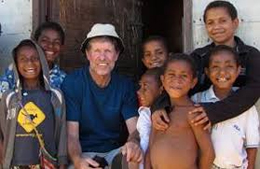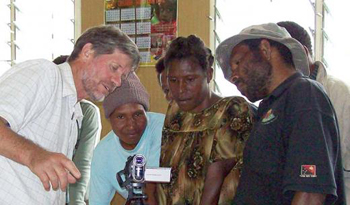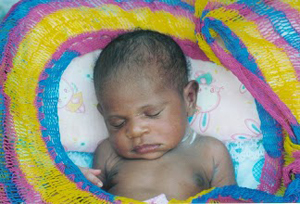Catholic Communications, Sydney Archdiocese,



24 Jun 2013

Fr Philip Gibbs SVD with Highlanders in PNG where he has spent the past 40 years
Anthropologist, photographer and film-maker, Caritas Australia research adviser and missionary priest, Father Philip Gibbs has found a unique way to empower the people of the PNG's remote Western Highlands. For a people with an oral tradition, many of whom are illiterate, instead of turning to the internet or giving them books to explore issues of concern, Fr Philip lets them use his video camera to explore these issues for themselves and to make their own films to enlighten others.
"I offer input but those making the films or videos are the ones who decide on the subject matter and write the scripts before going out to film different aspects of the issue they want to explore. Once it is all on film, I step in and help with the editing," he says.
The results so far are a series of powerful videos and short films, many of which are shown on local communal TV, raising awareness about such important subjects as HIV/AID, sexually transmitted diseases, tuberculosis which is once again destroying lives and malaria which like TB, is producing powerful strains of the disease which are resistant to drugs.
"One of the films we are doing at the moment has a group of students looking at the Value of Life. And what we've found is that with many of our HIV/AIDS programs there is not much point raising awareness if people don't want to be aware. And this depends very much on how people value their lives," he says.
The reasons for the lack of value some people in PNG place on their lives are complex. Poverty and lack of education are two reasons. This is further exacerbated by people who having left school early and unable to find work, turning to home-made alcohol and marijuana where they become more likely to engage in high risk behaviour that can result in contracting diseases such as HIV.
"The film looks at all these issues and while it doesn't provide all the answers, it is stimulating discussions and that's a good start," Fr Philip says.
By making their own films, the people of the Highlands have a voice with which to enlighten others.

Fr Philip Gibbs showing Highlanders how to use a video camera to make their own films
The films are not only shown on communal TV in the Highlands but increasingly on national TV across PNG.
One recent film looked at money, the way people use it in helpful positive ways and in unhelpful ways. Another explored PNG's street children or "taxi boys" as they are known and offered new insights and possible solutions.
"The media in countries like Australia are inclined to see PNG as a basket case with stories about sorcery and being burned to death as witches, instances of often shocking domestic violence and the reimplementation of the death penalty. But there is some really good work being done in PNG and although there are definitely some negatives, the story overall is a positive one," he insists.
In Australia to address a conference in Canberra on sorcery related violence in PNG last week, Fr Philip says the belief in sorcery lies in the culture of Melanesian spirituality and cites instances where if someone has an accident in some of the remote villages of the Highlands' jungles and mists, the question asked is usually "who is behind it?"
However sorcery is not as widespread as some sensationalist media stories have suggested, he says.
"The Simba province is regarded as the worst where of 3000 deaths last year, between 100-200 were sorcery related," he says. "While this is of great concern, as are the reports of domestic violence, these should not overshadow the large number of good loving marriages and strong healthy relationships between couples and their children that exist in villages throughout the Highlands."
Grounded in superstition, ignorance and fear, sorcery is found in isolated pockets of PNG and in some cases is being exploited by the unscrupulous to gain power and wealth. Perhaps surprisingly for some 90% of the population in PNG's census of 2000 describing themelves as Christians.
"On Sundays churches across the country are packed. In Mt Hagen, the Catholic churches are full to the brim. There are always very lively liturgies and numbers steadily increasing, particularly among young men."
Fr Philip has spent the past 40 years in PNG. Based in the Highlands, he works closely with the Australian born Archbishop of Mt Hagen, the Most Rev Douglas.

Fr Philip Gibbs loves photographing the men, women and children of PNG
Secretary of Social Concerns with the Bishops Conference of Papua New Guinea and the Solomon Islands, Fr Philip also works as a researcher for Caritas Australia and the agency's various projects in the Highlands. For the past several years these have included a program that ranged across the whole area of sexually transmitted diseases, including HIV.
"A lot of work has gone into this and supported by Caritas, Catholic Health Services have created a wide range of SDI management programs, begun training of health workers and establishing laboratories and services across three of the five provinces across the Highlands. It is a slow process but more and more people are becoming aware of these diseases and how they are contracted and how they can be managed," he says.
While malaria remains PNG's major health problem, until recently malaria-carrying mosquitoes were virtually unknown in the cooler climate more than 5000 feet above sea level.
"But with increasing temperatures, malarial mosquitoes have infiltrated new areas across the Highlands where people have never been exposed to malaria and have no resistance," he explains.
A priest with the Society of the Divine Word, Fr Philip grew up in New Zealand says learning as a teenager how to keep an old car on the road has come in handy in Mt Hagen and is proud that despite the horrendous unsealed muddy steep roads his Suzuki has to travel, he has managed to keep it going.
His ability with a camera is even more impressive. Self taught, he has become a renowned film maker in his own right and is now not only helping empower and give the PNG's Highlanders a voice but mentoring an increasingly impressive group of upcoming film makers and photographers.
SHARED FROM ARCHDIOCESE OF SYDNEY
SHARED FROM ARCHDIOCESE OF SYDNEY
Comments